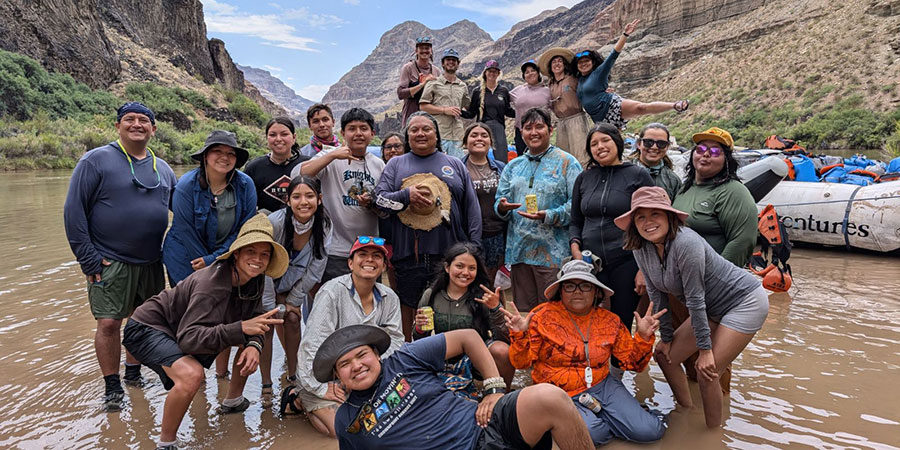
- Details
- By Native News Online Staff
The Grand Canyon Regional Intertribal Intergenerational Stewardship Expedition (RIISE) is now accepting applications for its fourth annual nine-day Colorado River rafting trip through the Grand Canyon, taking place July 20-28, 2025. Applications are open until April 14, 2025, for Indigenous youth ages 16-20 who are members of one of the associated Native American tribes of the Grand Canyon.
Hosted by the Grand Canyon Trust and Grand Canyon Youth, with support from Arizona Raft Adventures and Grand Canyon Expeditions, this intertribal, intergenerational journey aims to reconnect Native youth with their ancestral homelands. Participants should be prepared to camp outdoors along the Colorado River for nine days, hike, and spend extended time outside. Interested applicants must apply at grandcanyontrust.org/riise by Monday, April 14, 2025, at 5 p.m. MST.
RIISE will select up to 18 young leaders for this immersive experience, where they will travel alongside Indigenous knowledge holders, river guides, and environmental advocates. The program covers all transportation, meals, rafting equipment, and necessary camping gear. Accepted participants must also complete six weeks of pre-trip online education, exploring environmental justice issues in the Grand Canyon region and along the Colorado River. Understanding the canyon’s history and significance is essential for shaping future leadership and advocacy efforts.
Bennett Wakayuta, a Hualapai knowledge holder who accompanies the trip, shared, “I watch youth embrace a spiritual side they may not have known. Many take this growth home, using it to clarify their purpose in life and strengthen their connection to their homeland.”
Amber Benally, Diné, RIISE co-founder and Grand Canyon Trust’s just transition manager, emphasized the program’s impact: “Our people were forced from their homelands to make room for Grand Canyon National Park. Too often, I hear young people say, ‘there’s nothing there for me’ or ‘I don’t belong here.’ But we do belong. We are still here. Sharing knowledge and reconnecting with the canyon and each other is a powerful way to remember who we are as Indigenous people.”
One of RIISE’s core goals is to empower Native youth to define their leadership roles in the Grand Canyon’s future. Elena Klopfenstein, Diné, a 2023 RIISE participant who returned as a leader-in-training in 2024, reflected, “RIISE is a chance to be within my home. It reminds me that the Grand Canyon and other cultural sites, no matter how much red tape is placed on them, will always be my home and are worth protecting.”
Building meaningful connections with the canyon and fellow participants is central to the RIISE experience. 2024 participant Alexiana Mitchell, Diné, expressed, “I always carry RIISE with me. It’s such a beautiful and wonderful gift to witness. I often think about the little moments shared with old and new friends. I have learned so much.”
Indigenous peoples have historically been excluded from land management decisions and economic opportunities in places like the Grand Canyon. RIISE seeks to change that by supporting the next generation of Native conservation leaders. Grand Canyon Youth alumna and Diné river guide Shonri Begay shared, “The RIISE trip helps me envision a future where Indigenous voices are central, not on the margins. I hope to see more Indigenous guides and leaders working to protect and understand the land. Seeing Indigenous guides on these trips is a small but important step toward inspiring youth to see themselves as leaders in unexpected fields.”
Applications for RIISE 2025 close on Monday, April 14, 2025. More information and the application link can be found at grandcanyontrust.org/riise. Accepted participants commit to six weeks of pre-trip online learning and the full river trip from July 20-28, 2025. Questions may be directed to [email protected].
More Stories Like This
Native News Weekly (August 25, 2024): D.C. BriefsUS Presidents in Their Own Words Concerning American Indians
DHS Secretary Noem Tells Tribes ICE Does Not Target Native Americans
Native News Online Marks 15 Years of Warrior Journalism
I’m a Minneapolis Postal Worker. This Is What I Saw.
Help us defend tribal sovereignty.
At Native News Online, our mission is rooted in telling the stories that strengthen sovereignty and uplift Indigenous voices — not just at year’s end, but every single day.
Because of your generosity last year, we were able to keep our reporters on the ground in tribal communities, at national gatherings and in the halls of Congress — covering the issues that matter most to Indian Country: sovereignty, culture, education, health and economic opportunity.
That support sustained us through a tough year in 2025. Now, as we look to the year ahead, we need your help right now to ensure warrior journalism remains strong — reporting that defends tribal sovereignty, amplifies Native truth, and holds power accountable.
 The stakes couldn't be higher. Your support keeps Native voices heard, Native stories told and Native sovereignty defended.
The stakes couldn't be higher. Your support keeps Native voices heard, Native stories told and Native sovereignty defended.
Stand with Warrior Journalism today.
Levi Rickert (Potawatomi), Editor & Publisher


